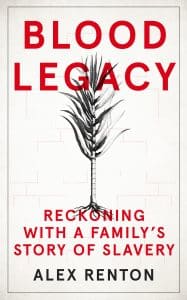Blood Legacy: Reckoning with a Family’s Story of Slavery
Canongate, May 2021
Through the story of his own family’s history as slave and plantation owners, Alex Renton looks at how we owe it to the present to understand the legacy of the past. When slavery was abolished across most of the British Empire in 1833, it was not the newly liberated who received compensation, but the tens of thousands of enslavers who were paid millions of pounds in government money. The ancestors of some of those slave owners are among the wealthiest and most powerful people in Britain today.
A group of Caribbean countries are suing ten European nations for a total of 4 trillion dollars for the damage inflicted on them. Meanwhile, Black Lives Matter and other activists groups are causing increasing numbers of white people to reflect on how this history of abuse and exploitation has benefited them.
Blood Legacy explores what inheritance – political, economic, moral and spiritual – has been passed to the descendants of the slave owners and the descendants of the enslaved. He also asks, crucially, how the former – himself among them – can begin to make reparations for the past.
–Longlisted for The Baillie Gifford Prize
Moving and deeply researched, Alex Renton’s account of his ancestors’ slaveholding brings home the everyday brutality of Caribbean slavery and its contribution to the making of Britain both then and since. Blood Legacy sets the ordinariness of slaveholding in the eighteenth-century monied world alongside accounts of the extraordinary lives of those they owned. This is a book that asks white Britons to look hard at our past and its consequences in the present. –Professor Diana Paton


